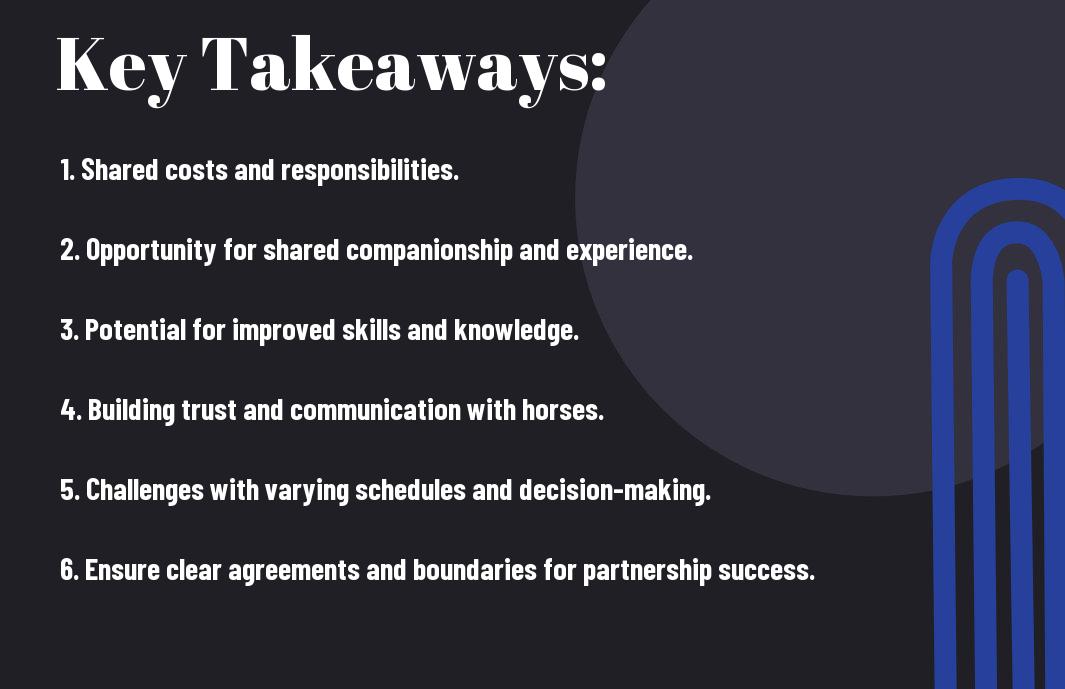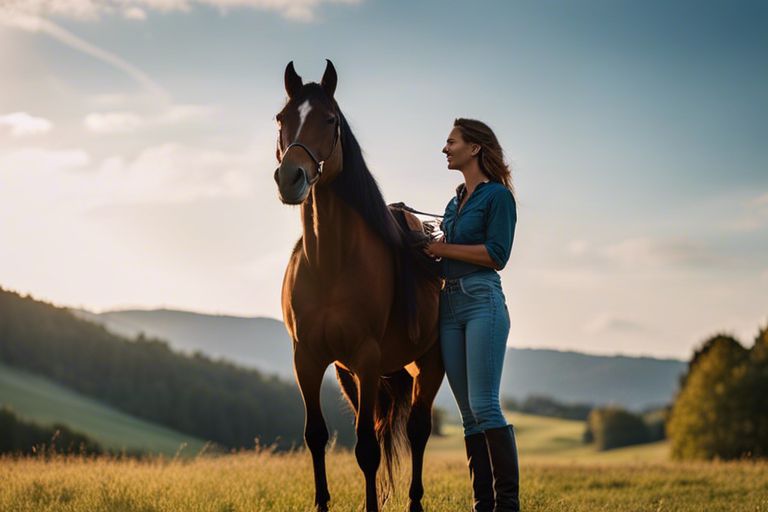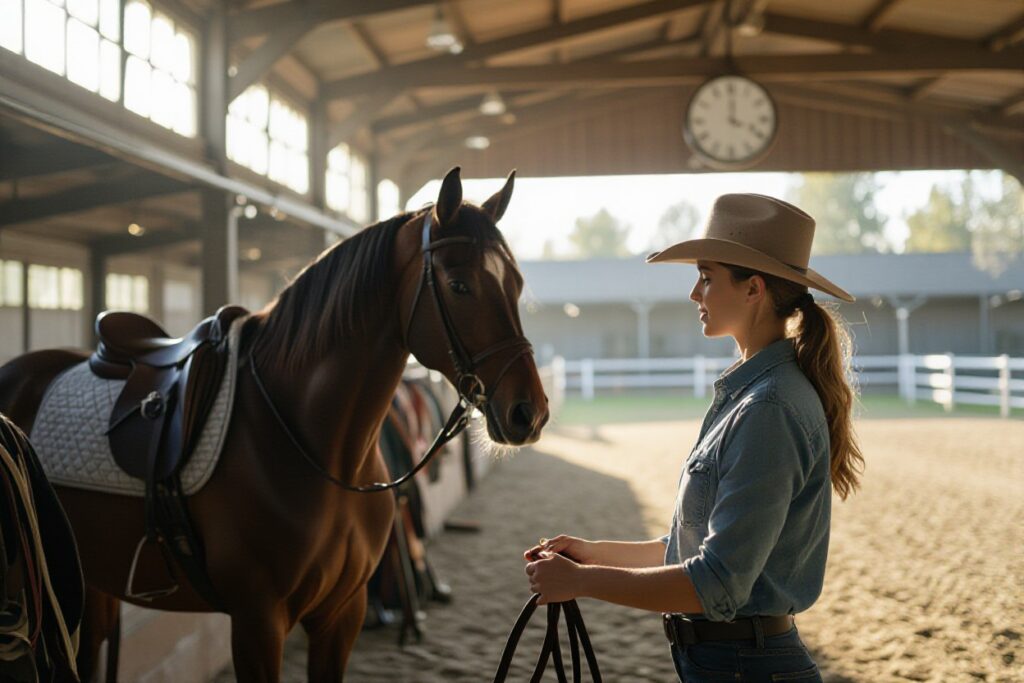Many are captivated by the idea of forming a partnership with a horse, unveiling a world of companionship and mutual understanding. However, the road to a harmonious relationship with these majestic creatures is not without its obstacles. In this blog post, we will examine into the benefits and challenges of horse partnerships, enlightening you on the joys and tribulations that come with forging a bond with these remarkable animals.

The Advantages of Horse Partnerships
Emotional Connection and Bonding
Before you dismiss the idea of forming a partnership with a horse, consider the profound emotional connection and bonding that can develop between you and your equine companion. Horses are incredibly sensitive beings who have the ability to sense your emotions and respond to them. Through regular interaction and care, you will establish a deep bond based on trust and mutual respect.
Improved Riding Skills and Confidence
Connection with a horse can do wonders for your riding skills and confidence. By working closely with a horse, you will learn how to communicate effectively through subtle cues and body language. This heightened level of communication will not only improve your riding abilities but also boost your confidence in handling these majestic creatures.
**Riding** becomes a more enjoyable experience when you feel in sync with your horse. As you develop a better understanding of each other, you will find yourself becoming a more skilled and confident rider.
Shared Responsibility and Teamwork
**Responsibility** is a significant aspect of horse partnerships. Caring for a horse involves a great deal of commitment and dedication. By sharing the responsibility of daily care and training with your horse, you will learn the value of teamwork and develop a sense of accountability. This shared responsibility will strengthen your bond and create a more harmonious partnership.
Building this level of **confidence** is not only beneficial in your equestrian pursuits but also translates into other areas of your life. The skills you acquire through teamwork and responsibility with your horse will undoubtedly have a positive impact on your overall confidence and self-esteem.

The Financial Aspects of Horse Partnerships
Even in the world of horse partnerships, financial considerations play a significant role. From cost-sharing to investment opportunities, understanding the financial aspects is crucial for a successful partnership.
Cost-Sharing and Budgeting
For cost-sharing and budgeting in a horse partnership, it’s important to outline clear agreements from the beginning. This includes determining how expenses will be divided, such as vet bills, farrier services, and boarding fees. By establishing a detailed budget and sticking to it, you and your partner can avoid misunderstandings and financial strain.
Investment Opportunities and Returns
Any investment in a horse partnership comes with its potential for returns. Whether you are looking to co-own a competition horse or invest in a breeding program, it’s important to research and analyze the financial prospects. Keep in mind that the horse industry can be unpredictable, so diversifying your investments can help mitigate risks and increase the chances of returns.
A smart way to approach investment opportunities in horse partnerships is by consulting with financial advisors or professionals in the equine industry. They can provide valuable insights and help you make informed decisions based on your financial goals and risk tolerance.
Liability and Risk Management
An important aspect of horse partnerships is liability and risk management. When you enter a partnership with another individual, you are not only sharing the joys of horse ownership but also the potential risks. It’s crucial to have legal agreements in place that outline each party’s responsibilities and liabilities. Additionally, obtaining adequate insurance coverage for your horse and partnership can provide protection in case of unforeseen circumstances.
Plus, maintaining open communication with your partner and having a clear understanding of the risks involved can help you navigate any challenges that may arise. By being proactive in managing liabilities and risks, you can enjoy the financial benefits of a horse partnership while minimizing potential setbacks.

The Logistical Challenges of Horse Partnerships
Now, let’s explore into the logistical challenges you may face when entering a horse partnership. These challenges can include issues with scheduling, communication, and decision-making processes.
Scheduling and Time Management
With the demands of daily life, finding time to coordinate schedules with your horse partner can be a significant challenge. Ensuring that both parties have adequate time to spend with the horse, attend training sessions, and schedule veterinary appointments can be tricky. It’s crucial to establish clear communication and set realistic expectations to overcome these scheduling hurdles.
Communication and Conflict Resolution
With any partnership, effective communication is key to success. **Misunderstandings** can arise if expectations are not clearly outlined from the beginning. Conflict resolution skills are also crucial when disagreements occur. **Navigating** through differing opinions on training methods, veterinary care, or competition goals requires open and honest communication.
The ability to communicate openly with your horse partner and address concerns as they arise is crucial for maintaining a healthy and successful partnership. Building trust and understanding each other’s perspectives can help navigate conflicts effectively.
Shared Decision-Making and Goal-Setting
One of the biggest challenges in a horse partnership is making decisions together and setting mutual goals. **Balancing** individual preferences and goals can be difficult, especially if both parties have different priorities. **Collaborating** on training plans, competition schedules, and long-term objectives requires compromise and understanding.
One effective way to tackle this challenge is through shared decision-making processes where both partners have **an equal voice** in determining the direction of the partnership. **Setting clear goals** together and working towards them as a team can **strengthen** your bond and improve overall partnership satisfaction.
Resolution
Resolution of these logistical challenges in a horse partnership requires **patience**, **flexibility**, and **effective communication**. By **acknowledging** the challenges and working together to find solutions, you can overcome these hurdles and **enjoy** the many benefits that come with partnering with horses.

The Benefits of Horse Partnerships for the Horse
Socialization and Companionship
Many horses thrive in partnerships because of the socialization and companionship they provide. With a horse partner, your equine friend will have the opportunity to interact, play, and bond with another horse, fulfilling their natural herd instincts.
Training and Development
Many horses benefit from partnerships as they offer continuous learning experiences. Development in a horse partnership can help improve your horse’s behavior, responsiveness, and overall training. Partnerships with other horses or even with you as their rider can aid in their mental and physical growth.
However, it’s imperative to remember that consistent and proper training is crucial in any horse partnership. Positive reinforcement and clear communication are key elements in shaping your horse’s behavior and skills.
Health and Wellness
For
Training
The Challenges of Horse Partnerships for the Horse
Overwork and Burnout
To the horse, one of the significant challenges of being in a partnership with a human is the risk of overwork and burnout. Horses are known for their strength and endurance, but continuous demands without proper rest and care can lead to physical and mental exhaustion.
Conflicting Training Methods and Philosophies
The conflicting training methods and philosophies between humans can be perplexing and stressful for horses. Each individual working with the horse may have a different approach, causing confusion and inconsistency in the horse’s training regimen.
Burnout: Horses may become overwhelmed and frustrated when receiving conflicting cues and commands from different trainers, impacting their ability to perform and learn effectively. It can also lead to behavioral issues and a strained relationship between the horse and humans.
Health Risks and Injuries
An ongoing concern for horses in partnerships is the health risks and injuries they may face. From overexertion to improper equipment use, horses can experience various physical ailments and injuries that can hinder their well-being and performance.
With proper care, training, and monitoring, these challenges can be mitigated, ensuring a harmonious and beneficial partnership between you and your horse. Note, understanding and addressing these challenges are crucial for the well-being and success of both you and your equine companion.
Navigating the Human Dynamics of Horse Partnerships
Building Trust and Respect
For a successful horse partnership, trust and respect are paramount. Horses are perceptive animals and can sense your emotions and intentions. Consistency in your actions, gentle handling, and spending time together can help build a strong bond of trust. Respect your horse’s boundaries and communicate clearly to establish a solid foundation for your partnership.
Managing Different Personalities and Expectations
Human dynamics play a crucial role in horse partnerships. Each individual, whether human or equine, brings unique personalities and expectations to the relationship. It’s crucial to understand and adapt to these differences. Patience, empathy, and effective communication are key in navigating through varied personalities and aligning expectations to ensure a harmonious partnership.
Understanding your horse’s temperament and learning styles can help tailor your training methods to suit their needs. Additionally, being aware of your own personality traits and communication style can aid in bridging any gaps that may arise in your partnership with your horse.
Dealing with Conflicts and Disagreements
Navigating conflicts and disagreements is inevitable in any relationship, including horse partnerships. When faced with challenges, remain calm and composed. Address the issues promptly, seek to understand the underlying reasons, and work together towards a resolution. Open and honest communication, coupled with patience and mutual respect, can help overcome obstacles and strengthen your partnership.
Approach conflicts with a solution-oriented mindset, focusing on finding common ground and compromising when needed. Bear in mind, challenges are opportunities for growth and learning in your journey with your horse.
To wrap up
With this in mind, horse partnerships offer a unique and rewarding experience for those who are willing to put in the time and effort to build a strong bond with these majestic animals. The benefits of forming a partnership with a horse include improved communication and trust, as well as the opportunity for personal growth and self-discovery. However, it is important to be aware of the challenges that come with these partnerships, such as the time and commitment required, as well as the potential for misunderstandings and frustrations.
Q: What is a horse partnership?
A: A horse partnership is a joint ownership agreement where individuals share the responsibilities and costs associated with owning a horse.
Q: What are the benefits of participating in a horse partnership?
A: Some benefits of participating in a horse partnership include reduced financial burden, shared workload, and the opportunity to learn from other experienced horse owners.
Q: What are some challenges of being in a horse partnership?
A: Challenges of horse partnerships may include disagreements over decisions regarding the horse, conflicts over scheduling, and differences in horsemanship philosophies.
Q: How can individuals mitigate potential challenges in a horse partnership?
A: Clear communication, establishing a written agreement outlining responsibilities and expectations, and regularly discussing any issues that arise can help mitigate potential challenges in a horse partnership.
Q: How can individuals find reputable partners for a horse partnership?
A: Individuals can find reputable partners for a horse partnership through networking within the horse community, attending equine events and clinics, and seeking recommendations from trusted sources such as trainers or veterinarians.











